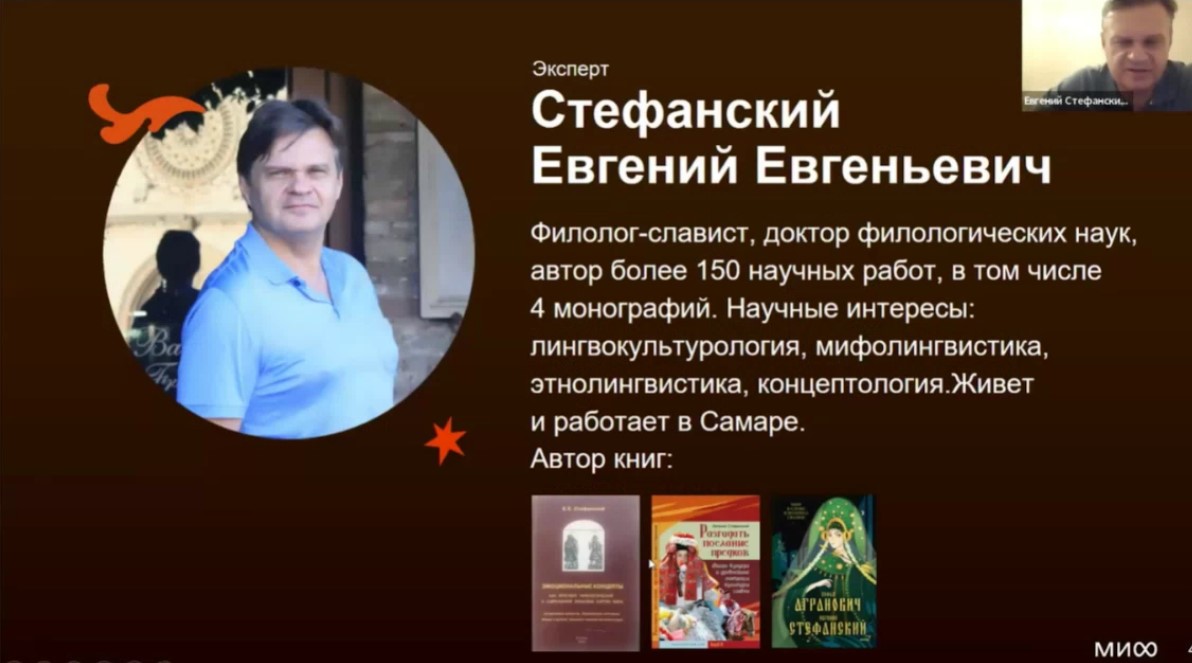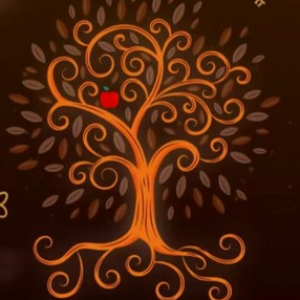At a very prestigious metropolitan virtual venue, Evgeny Stefansky, Doctor of Philological Sciences, Director of the Pre-University Training Centre, finished reading his cycle of lectures entitled “Language and Cultural Codes”. The webinars were organized by the team of media projects of the “MYTH” Publishing House, which Aleksandra Smirnova, who graduated from Samara University’s Faculty of Philology in 1993, works in.

Before the start of the first lecture, the webinar participants paid tribute to Professor Sofia Agranovich of Samara University, who would have turned 80 this year. Her methodology largely determined the scientific approach to analyzing the material presented in the cycle of lectures, as well as in the monograph by Sofia Agranovich and Evgeny Stefansky “Myth Embodied in the Word and Poetics of Fairy Tales” published this year by the “MYTH” Publishing House.
Decryption of cultural codes began already in the memories of S. Z. Agranovich’s followers. Elena Strelkova, a journalist from Samara, recalled how, seeing her sweater with one sleeve green and the other one gray, Sofia Zalmanovna was perfectly delighted and said that it was asymmetrical, like everything in folklore, because asymmetry symbolizes life. “I am glad that there are recordings of her lectures available on the Internet in the new book published by the “MYTH” Publishing House.
Evgeny Stefansky continued considering cultural codes in his lectures. He showed how such binary value oppositions as life/death, right/left, odd/even, male/female, etc., are reflected in language. In the introductory lecture, he spoke about the anthropocentric paradigm as the major branch in linguistics of the 21st century, about the language reflecting the naive human view of the world and about humanitarians who manage to explore “archaeology of consciousness”: this is the ultimate goal to be exactly set by Sofia Agranovich in her research.
Participants in the webinar learned how the gesture was fixed in the word, how ritual processions made the verb “gulyat” (to walk) ambiguous, which grandmother was visited by ladushki, where traces of such a type as Trickster could be found in language and literature, how the terrible “it” and “they” were reflected in the grammar and the works by Bulgakov and Saltykov-Shchedrin.
“Answering questions is a very important part of the lecture cycle”, says Evgeny Stefansky. “They not only allow getting feedback, but also prompting further thoughts. For example, in the context of the fragment of my lecture where I spoke that ambiguity of the verb “gulyat” (to walk) had arisen on the basis of cultural codes encrypted in the semiotics of any ritual procession, I was asked about the relationship between that verb and the adjective “ogulniy” (indiscriminate) ‘superficial, containing an unreasonable generalization’. Having promised to answer the question in detail at the beginning of the next webinar, I asked for time to think. In one of the Polish etymological dictionaries, I managed to find out that in Polish, the verb “ogulać” means ‘to surround in a ritual dance’. Thus, original ritualism of “gulyanie” (walking) was confirmed, and surrounding in a dance smoothed out human differences, making people something common, homogeneous”.
The author of the webinars considers promoting the Russian language and popularizing linguistics to be one of the most important missions of a professional philologist. “The desire to share gained knowledge about language and literature has become a cultural code that was embedded at the time in the students of the Faculty of Philology”, says Evgeny Stefansky. “My classmates and I twice went through the School of Young Philologist. At first, when we were schoolchildren and prepared for entering the University. And later, as students, taking our first steps in the profession and telling future students of the Faculty of Philology about what we ourselves had recently learned, and we received a powerful charge of professional energy to have been preserved for many years”.
